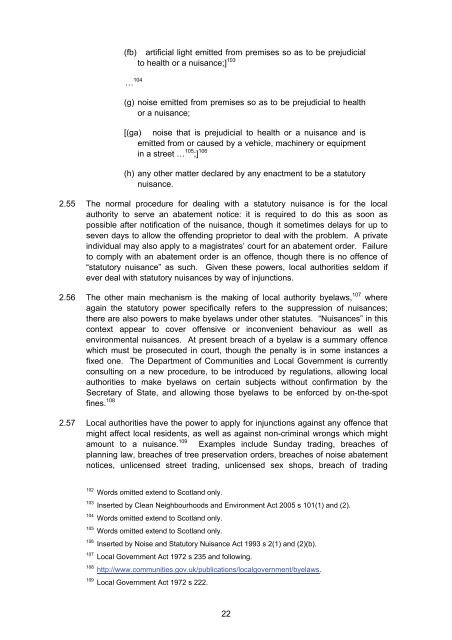public nuisance and outraging public decency - Law Commission
public nuisance and outraging public decency - Law Commission
public nuisance and outraging public decency - Law Commission
You also want an ePaper? Increase the reach of your titles
YUMPU automatically turns print PDFs into web optimized ePapers that Google loves.
(fb) artificial light emitted from premises so as to be prejudicial<br />
to health or a <strong>nuisance</strong>;] 103<br />
… 104<br />
(g) noise emitted from premises so as to be prejudicial to health<br />
or a <strong>nuisance</strong>;<br />
[(ga) noise that is prejudicial to health or a <strong>nuisance</strong> <strong>and</strong> is<br />
emitted from or caused by a vehicle, machinery or equipment<br />
in a street … 105 ;] 106<br />
(h) any other matter declared by any enactment to be a statutory<br />
<strong>nuisance</strong>.<br />
2.55 The normal procedure for dealing with a statutory <strong>nuisance</strong> is for the local<br />
authority to serve an abatement notice: it is required to do this as soon as<br />
possible after notification of the <strong>nuisance</strong>, though it sometimes delays for up to<br />
seven days to allow the offending proprietor to deal with the problem. A private<br />
individual may also apply to a magistrates’ court for an abatement order. Failure<br />
to comply with an abatement order is an offence, though there is no offence of<br />
“statutory <strong>nuisance</strong>” as such. Given these powers, local authorities seldom if<br />
ever deal with statutory <strong>nuisance</strong>s by way of injunctions.<br />
2.56 The other main mechanism is the making of local authority byelaws, 107 where<br />
again the statutory power specifically refers to the suppression of <strong>nuisance</strong>s;<br />
there are also powers to make byelaws under other statutes. “Nuisances” in this<br />
context appear to cover offensive or inconvenient behaviour as well as<br />
environmental <strong>nuisance</strong>s. At present breach of a byelaw is a summary offence<br />
which must be prosecuted in court, though the penalty is in some instances a<br />
fixed one. The Department of Communities <strong>and</strong> Local Government is currently<br />
consulting on a new procedure, to be introduced by regulations, allowing local<br />
authorities to make byelaws on certain subjects without confirmation by the<br />
Secretary of State, <strong>and</strong> allowing those byelaws to be enforced by on-the-spot<br />
fines. 108<br />
2.57 Local authorities have the power to apply for injunctions against any offence that<br />
might affect local residents, as well as against non-criminal wrongs which might<br />
amount to a <strong>nuisance</strong>. 109 Examples include Sunday trading, breaches of<br />
planning law, breaches of tree preservation orders, breaches of noise abatement<br />
notices, unlicensed street trading, unlicensed sex shops, breach of trading<br />
102 Words omitted extend to Scotl<strong>and</strong> only.<br />
103 Inserted by Clean Neighbourhoods <strong>and</strong> Environment Act 2005 s 101(1) <strong>and</strong> (2).<br />
104 Words omitted extend to Scotl<strong>and</strong> only.<br />
105 Words omitted extend to Scotl<strong>and</strong> only.<br />
106 Inserted by Noise <strong>and</strong> Statutory Nuisance Act 1993 s 2(1) <strong>and</strong> (2)(b).<br />
107 Local Government Act 1972 s 235 <strong>and</strong> following.<br />
108 http://www.communities.gov.uk/<strong>public</strong>ations/localgovernment/byelaws.<br />
109 Local Government Act 1972 s 222.<br />
22

















